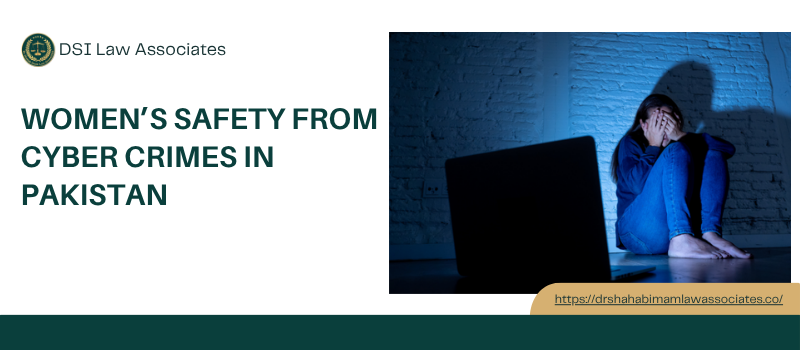Women’s Safety from Cyber Crimes in Pakistan

The internet has opened up communication, education, and empowerment opportunities—but new threats, especially to women. In Pakistan, cyber crimes have emerged as a major threat for women’s safety. From abuse on the internet to theft of data and threats, cyber abuse continues to grow in size. Victims are unaware of their rights or where to go to seek assistance. That’s where knowing cyber crimes in Pakistan, how to complain to FIA online, and when to approach a criminal litigation law firm becomes critical. This blog throws some light on how women can remain aware, report abuse, and safeguard themselves in an interconnected world.
1. Understanding Cyber Crimes and Their Impact on Women
Cyber crimes refer to illegal activities carried out through digital resources and the internet. They are hacking, theft of identity, financial fraud, and most importantly, online bullying and extortion—problems that predominantly affect women in Pakistan.
Predominant cyber crimes against women:
Unauthorised access to one’s own accounts, Sharing intimate images without consent, Bullying, blackmailing, and online stalking, Social media impersonation, Harassment by calls, emails, and messages
These activities not only infringe upon privacy but also damage mental health, reputation, and professional lives. Women are generally socially excluded due to their cultural environment, and therefore it is even more necessary to create awareness towards the protection of women online.
2. Legal Framework for Cyber Crimes in Pakistan
To counter the rise in cyber attacks, Pakistan has implemented the Prevention of Electronic Crimes Act (PECA) during 2016. Under this act, the FIA (Federal Investigation Agency) is the lawful agency which conducts inquiry and prosecutions in cyber crimes.
Substantial provisions of PECA related to women’s safety:
Section 20: Offences against a person’s dignity, including defamation over the internet.
Section 21: Involves unauthorized usage or distribution of intimate pictures.
Section 24: Addresses the issue of cyberstalking.
Section 25: Declares spamming, commonly used for harassing or scamming women, a criminal act.
The FIA cyber crime helpline and its website allow one to report the crime anonymously and efficiently. The victims can file an FIA online complaint through the National Response Center for Cyber Crime (NR3C) portal.
Despite the presence of existing law, the majority of cases remain unreported due to ignorance or fear. This is where criminal litigation law firms step in to assist victims through legal processes and obtain justice.
3. Step-by-Step on How to Report Cyber Crimes
If you or someone you know is a victim of cyber harassment or abuse, take action immediately. Below is how to make a complaint against cyber crimes in Pakistan:
Step 1: Gather Evidence
Take screenshots, save messages, and note the date and time of all the episodes. Writing it down is the backbone of your case.
Step 2: File a Complaint
Visit the official website of cyber crime of FIA: https://complaint.fia.gov.pk. Select the complaint type, provide your details, and upload the evidence.
Step 3: Use the Cyber Crime Helpline
You can also seek assistance and information from the FIA Cyber Crime Helpline (1991).
Step 4: Seek Advice of a Lawyer
If the matter becomes unruly or in case you are unsure of what to do, you can call a criminal litigation law firm. Expert legal aid navigates the justice system and ensures your complaint is valid.
4. Law Firms and Community Support in Women’s Safety
While reporting to the FIA is essential, expert legal help can turn out to be the game-changer in obtaining justice. A criminal litigation law firm provides:
Legal advice in cyber crime matters
Assistance in making evidence and documents ready
Court representation in case charges are filed
Along with legal aid, awareness and education among masses are also a key contributing factor towards improving security of women. Schools, educational institutions, and workplaces must incorporate digital literacy and cyber security seminars. NGOs and activist organizations provide victim support psychologically and legally.
Empowering women to speak out, step forward, and take action enables the breaking of silence and ignominy of online crimes. Together, the legal apparatus, families, communities, and people can create secure environments online.
FAQs
- How do I handle it if someone is threatening me online in Pakistan?
Collect evidence and report immediately using the FIA online complaint portal or the cyber crime helpline (1991).
- How does the FIA help cyber crimes?
The FIA chases online threats, online harassment, blackmail, and data breaches. It can take legal action and apprehend criminals.
- What is the Pakistan cyber crime helpline number?
FIA Cyber Crime Helpline is available at 1991 for quick assistance.
- Can I report a cyber crime anonymously?
Yes. You get contact information for follow-up but you are kept anonymous and you may exercise your right to privacy if investigated.
- How do law firms help in cyber crimes?
A criminal litigation law firm offers expert guidance, helps wth filing complaints, advocates victims before courts, and makes sure cases are legal.
Conclusion
Cyber crimes in Pakistan are a growing threat, especially to women who utilize the internet. From harassment to identity theft, the threats are genuine—but so are the solutions. Familiarizing yourself with your rights, lodging complaints through the FIA online complaint portal, and approaching credible criminal litigation law firms for support are powerful beginning steps. Utilizing legal mechanisms and community support in tandem, we can empower women’s security and convert cyberspace into a platform of empowerment, not fear. Make your voice heard, take action, and assist in creating a safer internet for all.
